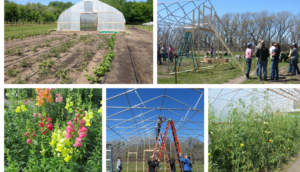Final report for WSP17-010
Project Information
a) Topic(s)- In 2017-2018, the Montana PDP aims at facilitating and increasing farmers,
ranchers, agricultural professionals and educators, and citizens in Montana (audience, hereafter) gain knowledge and share experiences related to sustainable agriculture principles and tactics.
The knowledge gained and experiences shares should, in turn, strengthen the audience's ability to make informed decisions related to sustainable agriculture and natural resource management.
To achieve this vision, four specific objectives are established: 1) provide support for in-depth
training on sustainable agriculture through workshops, field days, professional meetings, and
other activities as appropriated, 2) facilitate training opportunities for educators interested in
agricultural sustainability, 3) promote and coordinate SARE-related activities, and 4)
communicate, report, and evaluate the Montana PDP activities. Specific topics that will be
covered could include climate change impacts and mitigation, cover crops and cropping system
dive rsification, ecologically-based pest management, livestock and pasture management, local
food production, and crop-livestock integration.
b) Context, justification and assumptions.
Sustainable agriculture is at the crossroads. Critics view sustainable agriculture production as an ideologically driven and ineffective approach to farming and ranching that does not allow
humankind to respond to global challenges such as population growth and climate change.
Concerns associated with sustainable agriculture include yield reductions, lack of effective pest
and nutrient management tactics, soil erosion due to excessive tillage, and the use of land to
grow green manures and cover crops instead of crops or animals for direct human consumption.
Advocates of sustainable agriculture point to an environmentally benign approach to farming
with reported increased soil health and ecosystem services, as well as socio-economic benefits.
Thus, it is required to facilitate knowledge distribution on sustainable agriculture to enhance
producers skills to meet growing demands for yields while sustaining the environment's ability
to provide for social, and ecological services. To achieve this goal, the Montana PDP has two
main educational priorities: 1) Collaborate in generation and distribution of knowledge related to sustainable agricultural production, and 2) Offer training and educational opportunities to
enhance the adoption of sustainable practices.
c) Stakeholder and partner involvement. The Montana Western SARE PDP works in association
with a stakeholder advisory committee to plan sustainable agriculture activities and to reviewers
of mini-grant or travel scholarship applications. The advisory committee is composed by Brad
Bauer. Gallatin County Extension Agent, Jane Mangold -MSU Rangeland Invasive Plant
Specialist, Fabian Menalled-MSU Cropland Weed Specialist, Montana WSARE PDP
coordinator. We also meet twice a year and discuss research and education priorities with the
Montana Organic Advisory and Education Council (OEAC, http://www.oaecmt.org/ourmission.
html). The advisory board establishes the project priorities and reviews proposals and
travel scholarship applications.
Objective 1. Provide teaching and learning opportunities to enhance Montana agricultural
professionals' knowledge on sustainable agriculture through mini-grants. The Montana
Western SARE-PDP will allocate $15,000 to support demonstrations projects, workshops, and farm
tours in sustainable agriculture through competitive-mini grants program.
Objective 2. Offer travel scholarships to regional and national conferences/workshops related
to sustainable agriculture. The Montana Western SARE-PDP will allocate $1,062 for scholarships to
Extension personnel to participate at regional or national meetings on sustainable agriculture.
Objective 3. Promote awareness of sustainable agriculture. To enhance the involvement of
agricultural professional we will distribute materials and promote activities on sustainable
agriculture.
Advisors
- (Educator and Researcher)
- (Educator)
- (Educator and Researcher)
Education
Montana is interested in promoting the adoption of sustainable agricultural practices through a focused educational outreach program targeting agricultural professionals in both the conventional and non-conventional realms. The goal of this outreach is to improve the knowledge base of agricultural consultants and to encourage adoption of sustainable practices by professionals and producers. The primary mechanism of this is the mini-grant program which provides a small grant to agricultural experts to attend workshops, professional development, field tours and other programs to educate themselves in sustainable practices. These professionals then provide workshops, outreach, publications, and seminars to other professionals and directly to the producers. On farm demonstrations, hands-on activities and research plots are encouraged in an effort to engage growers and community members.
Education & Outreach Initiatives
Enhance agricultural professionals' knowledge and abilities in the area of sustainable agriculture through the funding of travel scholarships (mini-grants) to attend workshops, conferences and seminars related to sustainable agriculture. The goal is to improve the knowledge and understanding of the agricultural consultant which is then transferred to the producer via workshops, seminars, demonstrations, and other outreach mechanisms.
The Montana Western SARE professional development program supported four travel scholarships in 2018 for thirteen MSU Extension Agents and five producers to improve their knowledge base through attendance of professional conferences, field days, and train-the-trainer opportunities.
Eight Agents shared a $2800 travel scholarship to attend the National Association of County Ag Agent (NACAA) conference in Chattanooga TN. This opportunity allowed the agents to network with other Extension educators throughout the Country and to obtain valuable ideas, knowledge, and skills in sustainable agriculture. SARE programming was showcased through an entire concurrent session over the three day conference and included field tours as well as super-seminars and colleague presentations.
Two Extension Specialists each received a scholarship to attend conferences one a training in Utah on poisonous plants and the other a train-the-trainer program on recognizing herbicide injury at UC Davis.
Three agents and five producers attended a field demonstration, seminar and research plot on growing Haskaps, (honeyberries) in cold climates in Saskatchewan Canada through a travel grant.
In 2019, a $500 mini-grant funded one Extension Educator to finish the online Master Beekeeping Program from the University of Montana in order to become a better resource for clients in northeastern Montana; another Extension educator attended the Western Apicultural Society meeting in order to gain valuable insight to help her plan and implement a pollinator conference in Montana. A $610 travel scholarship funded an Extension Educator to attend a high-tunnel conference to gain valuable professional development that she used to erect a high tunnel on the Fort Peck Reservation and is working on curriculum to educate local tribal members how to extend their growing season and utilize the high tunnel to grow traditional and introduced foods. Eleven hundred dollars in travel funds were used to send a educator to a supply chain simulation conference and training seminar so that he can reach out to livestock producers in Montana and help design and incorporate supply chains to get locally sourced beef to retail outlets. And another mini-grant was used to send two Research Scientists and a grower to a conference on developing a multi-state collaborative partnership to preserve heritage fruits and orchard economies in the west.
The agents attending NACAA were able to bring back new ideas, new innovations, knowledge, skills and abilities to improve their outreach and programming goals. Alison Kosto, Broadwater Count Agent stated: "I gained the most from getting ideas and inspiration from other states and programs. I came back with a few ideas of programs that I may try to implement in my county." Pat McGlynn, Flathead County Agent attended a session on growing industrial hemp that described the challenges and opportunities for production of this crop. Wendy Becker, Fort Peck Reservation Agent attended the horticultural pre-tour with Agents across the nation. Though she was the only non-horticultural assigned agent on the tour, the other agents embraced her company and engaged her in conversations from high tunnels to vineyards. This created an unique learning environment for Wendy and she developed lasting relationships with colleagues from other regions. Montana was also recognized by earning several national awards, winning the Search for Excellence in three of nine areas: 4-H Education Programming, Sustainable Agriculture, and Crop Production; as well as having a national finalist in the Environmental Quality, Forestry & Natural Resources area. Montana also won the Educational Poster contest and had a national finalist in the Research poster contest, and was well represented in the communications area with a national finalist and a regional award as well.
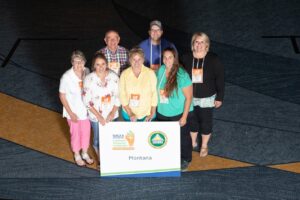
Noelle Orloff, attended a national conference on Sustainable Poisonous Plant Management in St. George Utah. The Specialist is now in the process of creating a new joint publication with NRCS about poisonous plants of concern in Montana. She increased her knowledge base of poisonous plant identification, gained an appreciation of her knowledge gaps, and fostered a collaborative spirit in her to reach out to her colleagues in Animal and Range Sciences for future projects.
Tim Seipel is the new Crop Weed Specialists and in an effort to improve his knowledge base of how herbicides affect non-target plants he attended the train-the-trainer seminar "Herbicide Symptom diagnosis hosted by UC Davis. Tim learned to better identify herbicide injury on a diverse group of crops and how to apply different rates to recreate herbicide injury symptoms in field demonstrations in Montana for Agent professional development. Tim returned to Montana and held four workshops on herbicide carryover and injury, training a total of 126 producers and professionals.
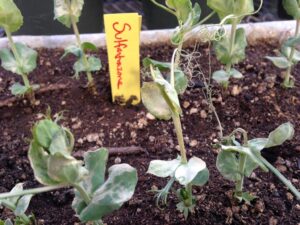
Finally, Western SARE PDP mini-grants provided travel funds for three Extension Agents and Five producers to attend an international conference in Saskatoon Canada on growing Haskaps a new potential fruit for Montana. The conference provided the participants with knowledge of the challenges and rewards associated with growing haskaps, as well as the current research and trials being done in a climatically similar region. Pollinator presence and importance in the production of the berries was discussed by Montana's Western Ag Research Center Superintendent, Zach Miller. Growing, harvesting and marketing of haskaps and networking with growers proved to be the most valuable parts of the event.
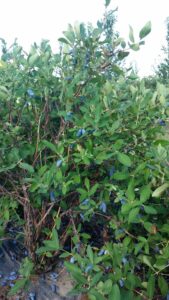
in 2019 Shelley Mills completed the third and final segment of the online Master Beekeeper Program hosted by University of Montana. The classes culminated in a final paper that was submitted to the Journal of NACAA and published in December 2019 (https://www.nacaa.com/journal/index.php?jid=998). As a result of completing the program, Mills is more confident in her knowledge and understanding of honey bees and honey production. She has been selected as the Montana Director of the Western Apicultural Society for 2020. Following the completion of her certification, Mills held two workshops on beekeeping, an introduction to beekeeping day long workshop in March and a Hive Wintering and Honey Extraction workshop in September. Evaluation of the workshops indicated that 100% of people who attended that had not owned bees were confident enough to purchase hive equipment, bees, and protective gear to start their own colonies and 75% of those respondents plan to start keeping bees in 2020. The twenty-two participants ranked the introduction to beekeeping workshop a 4.97 out of 5. Seventeen participants ranked the Hive Winterizing and Honey Extraction workshop a 4.95 out of 5. Changes in behaviors as a result of the class include: "need to change to allow winterizing", "will add top hive entrances to assist winter survival", "will use a different strategy for controlling varroa mites"," I am more knowledgeable about pest control & different overwintering options - I feel more confident". In a survey conducted in January 2020 following the 2019 workshops, Mills was able to show that among non-beekeepers the confidence level and knowledge gained (understanding) increased by 78% for equipment; 63% for bee biology; 68% for winter hive preparation and 70% for pest management. Among beekeepers with 1 to 3 years of experience the confidence and knowledge gained (understanding) increased by 34% for equipment; 38% for bee biology; 29% for winter hive preparation and 30% for pest management. Among those with three to ten years of experience, the confidence and knowledge gained (understanding) increased by 30% in all content areas. For beekeepers with over ten years of experience the confidence and knowledge gained (understanding) was 5% in both equipment and bee biology, 20% in winter hive preparation and 25% in pest management.
Unintended outcomes of this project is that Mills became the Montana Director for the Western Apicultural Society and is currently seeking grant funds to start a honey bee learning laboratory.
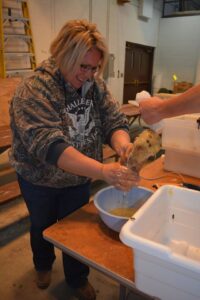
High Tunnel Conference attended by Wendy Becker, MSU Fort Peck Reservation Extension Agent. Topics learned from the conference included how to get started in high tunnel production, berry production, how to make money from your high tunnel production, what does season extension mean in our climate, a chef’s perspective panel, composting plant waste, food safety, and vegetable production. It is intentional that I wanted to get the closest climate and growing conditions to NE Montana to aid in growers questions here. The Williston Research and Extension Center also has a system that they put up a few years ago and continue to grow their knowledge in our conditions as well. We have wind, snowload, and water issues different from other places. Additionally, many of those putting up a high tunnel are getting assistance through the NRCS program, which can have special rules to follow. I have been able to ascertain what many of those issues are and help producers and NRCS personnel with questions as they arise.
Changes in ag professional’ attitudes or understanding: I have gained a lot of knowledge from the conference itself, but also from networking with other people at the conference who are actively growing production from high tunnels. There is a vast difference from growing out in the open vs. a high tunnel and you have to completely change your mindset. I also have found that it can be more labor intensive to constantly watch conditions inside a high tunnel atmosphere, however, there are tools that can help with that as well. The desert climate and inputs are a big factor to changing how one thinks about high tunnel production. Seeds, water, nutrients, temperature, and pests all affect growing conditions differently.
Changes in ag professionals’ behavior and action: Because I have gotten many questions about high tunnels, and I have an interest myself in production, I have found out that there wasn’t a lot of expertise locally on the subject. I decided that I could help alleviate some of that by learning more. This WSARE grant allowed me that and to start the process for erecting one here at the Fort Peck Tribes. We are in the process of a plan to get some going. Additionally, there were three that got accepted in the area to be put up and I was able to help with questions, logistics, planning, and other support for farmers to rely on, especially on physically making decisions about structure type, size, and budgets.
Unintended outcomes:The biggest outcome has been the momentum to put up some high tunnels near the office of the Fort Peck Tribal Building, where the Fort Peck Natural Resources Department has set aside 10 acres to use. We have a plan underway for building some, educational opportunities, and life skill development. We want to incorporate traditional and advanced practices, and showcase food production. Extending our season is a big plus since our growing season here is shorter, but traditionally the types of food of a Native American diet fit well with season extension type foods such as squashes and root vegetables. We are looking forward to better conservation practices, and direct education programs.
Individual Professional Development (Travel) - anyLogistix Supply Chain Simulation and Analysis Software Training attended by Tommy Bass
Activities and methods: The primary activity was my participation in an interactive and live training for supply chain analysis and modeling. The workshop was lecture-based with ample individual computer time and coaching to introduce methods of supply chain analysis through modeling.
Acquisition of new knowledge and skills: The workshop introduced me to supply chain analysis techniques and modeling, including: GIS, agent-based, and system dynamics modeling methods and specifically the anyLogistix software. Activities/topics included: Facilities Location Planning and Green Field Analysis, Supply Chain Design, Supply Chain Master Planning, Dynamic Simulations, Supply Chain Analysis, and Inventory Optimization.
Changes in ag professionals’ attitudes or understanding: This workshop enforced my belief that supply chain modeling can be valuable for local and regional food systems, but that the process of collaboratively collecting data and sketching out the supply chain (called a value chain in agri-food systems) with agri-food entrepreneurs could be just as valuable. Little is published in the literature about strategic supply chain management for small companies, let alone small agri-food enterprises. I believe that simple models will be appropriate for my interests in local regional food systems (emphasis on local meats). Simple models and their basic outputs will help communicate concepts to Extension clients, but they may remain difficult to use for the near future. I am now curious about how we can best adapt such powerful tools, appropriately, to assist clients in smaller scale agri-food value chains.
Apiculture Education to Enhance Environmental, Agricultural & Life Quality attended by Domonique Woodham
Although I had a thorough education in honeybee biology and management through the University of Montana Master Beekeeper program, I had only a general, broad knowledge of forage varieties to plant for pollinators and some basic common sense ideas of how to farm/ranch in a more bee friendly manner. Presentations by Sarah Red-Laird, Kathryn Prince, Megan Milbrath, Judy Wu-Smart and Katrina Klett were particularly informative and inspiring. Highlights included the importance of integrated pest management to maintain colony health with reduced inputs, how climate is impacting pollinators, and considerations for designing and implementing pollinator habitat whether it is in a city, small town, or on a farm. Sustainable land management concepts and techniques that enhance environmental and habitat quality were emphasized by presenters and demonstrated through farm tours.
CHANGES IN AG PROFESSIONAL’S ATTITUDES or UNDERSTANDING : I learned so much more about integrated pest management for honeybees and designing habitat for pollinators.
One of my changes in attitude following this conference was where to focus my educational efforts regarding pollinators. I typically have focused on honeybees; their biology and health, and now feel that my efforts should be focused more so on habitat protection and creation. Between presentations and conversations at this conference combined with my experiences as a 4-H Beekeeping Project Leader, it is apparent that although anyone can be a beekeeper, not everyone should be a beekeeper. The best way for people to help, “Save the Bees!” and keep both honeybees and native bees strong and healthy is to design landscapes and plant forage that is beneficial to both, and helps improve environmental quality and enhance the quality of life for society as a whole.
Other changes in action for me are that I am now also a member of the newly formed WAS Education Committee that will be evaluating WAS education and outreach activities of the past, and creating and organizing new apiculture education opportunities for the future. This opportunity opened the door to being awarded a travel scholarship to attend the Integrated Pest Management for Bees Workshop in Ames, IA with the Midwest Working Group two weeks post WAS where I was able to participate in varroa mite removal demonstrations. These professional development opportunities will only continue to open the doors to new opportunities for me which I can then turn around and share with my clientele in Extension and 4-H.
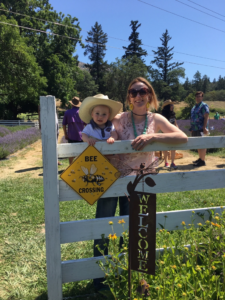
Developing Multi-State Collaborative Partnerships to Preserve Heritage Fruits and Orchard Economies in the West Attended by Katrina Mendrey
The conference was a day-long event organized by University of Idaho and Montana State University and was attended by over 60 pomologists, Extension professionals, heritage apple enthusiasts and historians. Outcomes from this event impacting growers and Extension professionals in Montana and Western states include new partnerships among WSU, MSU, U of ID and U of WY to collaborate on research projects and apple identification efforts, the exchange of information between researchers, professional orchardists and enthusiasts who normally do not have the opportunity for such horizontal information exchange and the potential to continue to cultivate these relationships and projects through other conferences.
The purpose of the event was to exchange information about concurrent programs in WA, OR, MT, ID and WY with respect to preserving heritage orchards and the unique fruits they sustain. Presentations focused on presenting information from each states’ respective heritage orchard program from those involved whether it be university affiliates, citizen enthusiasts or local historians. In addition to attending the conference, Mendrey and Miller also lead two presentations. The first included an overview about Montana’s own Heritage Orchard Program and our related projects to identify cultivars with the unique qualities needed for commercial dessert and cider production in Montana.
Mendrey also facilitated a group discussion about setting goals and next steps for continuing collaboration amongst university, non-profit and advocate stakeholders with an interest in preserving heritage fruits and understanding their role in a changing climate. Outcomes from this discussion included the organizer’s committing to making the gathering a bi-annual event and submitting a multi-state Specialty Crop Block Grant to synergize the efforts of geneticists, fruit prospectors and historians working to understand the role of heritage fruit production in the future of growing fruits in the Northwest and Intermountain West.
All participants were surveyed after the event to gather their thoughts on the event itself and future efforts they may not have shared during the group discussion. Survey Monkey was used to gather and analyze the results which indicated that 88% of the conference attendees felt it was either “Very Good” (38%) or “Excellent” (50%) and 100% would like to attend again. Participants reported that the passion of the speakers and the topics covered as well as an effort to create an action plan at the conclusion were among their favorite aspects of the conference. One in particular wrote, “It got a diverse group of individuals from the intermountain west that are interested in preserving genetic diversity in apples, together and mobilized as a potentially collaborative force going forward.” In addition to this feedback, Sandy Perrin whose travel these funds sponsored, reported that, “Attending the Heritage Orchard Conference in Sandpoint gave me a better perspective of what’s available for the local heritage apple enthusiasts that I come into contact thru my job with the Extension office. I am able to give people resources of where to get information and maybe help in starting a local food movement could bring vibrancy to the economy, keeping nature’s bounty in the area and allowing people to buy produce grown near their homes.”
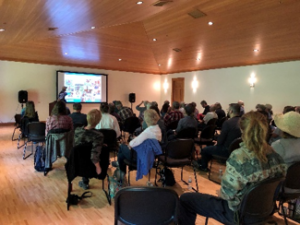
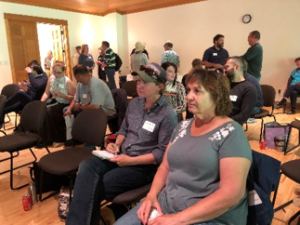
To provide quality education to producers, consultants, agricultural professionals and the community through workshops, seminars, field days, demonstrations and on farm research funded by the Montana mini-grant program.
The Montana Western SARE mini-grant program provided funding for nine workshops, a farm tour, a range tour and a field day where producers and agency personnel exchange information, ideas and were educated. The Grass to Grill workshops funded by a $3000 mini-grant to Elin Westover, Carter/Fallon County Extension agent brought innovative education to rural communities and a value added product to tables. Funds were used to purchase sausage making equipment, create curriculum, and train regional Extension Agents collaborated to provide six workshops in southeast Montana. The educational focus was on food safety, sausage ingredients, flavor mixing, cuts of meat, basic sausage making, and equipment to increase awareness of meat processing and utilizing value added cuts of meat.
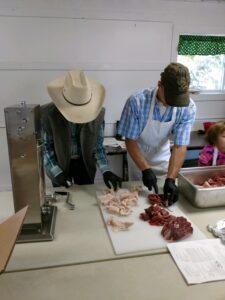
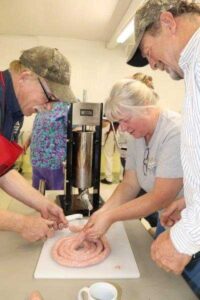
A range tour was conducted by Roosevelt County Extension Agent Jeffery Chilson in collaboration with the regional NRCS offices. The participants traveled to the field to address noxious weed management in range and pasture, range monitoring strategies using technology, solar water pumping, and bale grazing. Publications, handouts and advertising for the event were funded through a mini-grant.
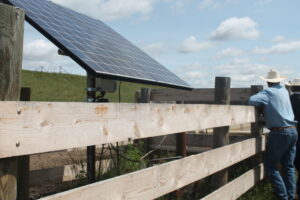
The Organic Advisory and Education Council (OAEC) teamed up with the Western Agricultural Research Center (WARC) to host the 2018 Farm Tours and Organic Principles Review in the Bitterroot Valley of Southwestern Montana with their Western SARE PDP mini-grant. The tour focused on integrated organic weed management, soil fertility, and the sustainability of organic grain, fruit and vegetable production. The tour visited Luna Llena Vineyards, Tucker Family Farms, Mill Crick Farm, and WARC where research leads to improved production.
Extension Educator, Elizabeth Werk, Fort Belknap Reservation Agent, held a workshop and field tour revolving around the use of solar pumps in the remote areas of the reservation where power access is limited. The Western SARE PDP grant helped to cover the travel costs of their speakers.
With Western SARE PDP grant funds, Mary Burrows, Extension Plant Pathologist, hosted an integrated pest management workshop focusing on entomology. County Extension Agents, CCA's, and other agricultural professionals learned about the Schutter Diagnostic Laboratory, Plant Growth Center and entomology research centers. The program provided hands-on experiential learning of integrated pest management practices including pest identification, management strategies, and integrated alternatives to chemicals.
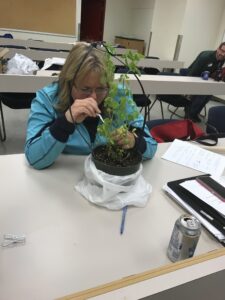
Alternative Energy Resources Organization (AERO) received a mini-grant that was used to support grower attendance for five "Farmer Fellows" to their annual EXPO held in Missoula MT. The "Fellows" program covers the cost of their attendance in exchange for a detailed report of their experiences, knowledge gained, and skills acquired while at the conference. The keynote speaker was Dr. Miguel Altieri, who spoke to participants about "Scaling Up Agroecology For Climate Resilience and Food Sovereignty". The program included several presentations under four broad topics, home arts building, ag, energy and resilience which were presented both in either a practical skill based manner or a more academic/research based venue. Lectures were provided on specialty grain breeding, production, and marketing; and integrated weed management in organic systems. Field tours were provided in conjunction with the lectures highlighting the research being conducted at MSU's Western Agricultural Research Center (WARC) in Corvallis MT.
Thirty one MSU Extension agents participated in six professional development workshops providing them with skills, knowledge and abilities that helped them provide education and training to their clientele. The sausage workshops were repeated by the trained agents in five more locations just prior to hunting season, bringing the value added meat program to 85 attendees and allowing them to take their newly acquired knowledge home and put it to use immediately. Participants that had never made sausage before indicated a greater confidence in making the specialty meats, purchasing and operating equipment, and ensuring they created a safe product to eat. Many attendees indicated that they were more likely to try making their own sausage and were more attentive to ingredients in commercial sausages. Plans for future workshops throughout the fall and winter of 2018-2019 will ensure that the education is provided region-wide.
Forty-seven farmer/ranchers, NRCS specialists, and Extension agents learned about using solar power to pump water to stock wells and improve range and pasture land values in two separate workshops. The range tour was rated a 4.75 out of possible 5 by the attendees, 100% indicated that the information they received improved their range management knowledge, and 83% agreed they had learned something new in the workshop.
Fruit production and organic farming in Montana are two areas of sustainable agriculture that is seeing an increase in acceptance and interest. The Organic Advisory and Education Council (OAEC) tour brought the two concepts together in one impactful workshop. The Bitterroot Valley tour engaged 45 growers in an experiential learning environment where they learned from on farm demonstrations, research plots, and consulted experts about topics such as controlling hard to kill weeds like bindweed, and incorporating cover crops in organic fruit production fields.
The IPM workshop brought about a change in professionals attitude and behavior by improving their confidence in providing integrated approaches to pest problems as an alternative to conventional chemical applications. Nearly 90% of the participants will use IPM strategies in their business operations.
Participants of the AERO workshops indicated that they improved their knowledge in the area of growing and processing crops as well as in forming and engaging with cooperatives. Dr. Altieri's most significant impact on the growers was to encourage them to be "lighthouses" where they serve as examples and mentors to other producers interested in farming with a holistic systems approach.
Creating publications that are easily disseminated can change the attitudes, skills and abilities of agricultural professionals and growers over a broad range of topics. Increasing awareness and encouraging adoption of sustainable farming practices is the main goal of Western SARE related publications.
The creation of wildfire preparedness packets was the brainchild of Domonique Woodham the Natural Resources Agent in Gallatin County, with her WSARE grant. Domonique created kits that included the following booklets and pamphlets: The Montana Wildfire Information Directory; Improving Agricultural Sustainability Following Wildfire; Fire Prevention on the Farm & Ranch; How to Prepare Your Home for Wildfires; Living With Fire-Homeowners Fire Sage Guide for Montana; Ready, Set, Go Montana; Quick Guide for Landowners to Manage Their Noxious Weeds After Fire; and Integrated Noxious Weeds Management After Wildfires. These kits were distributed to interested persons through eight separate events held throughout the summer, and to 18 counties in Montana as well as five adjacent states.
An unintended outcome of the kit preparation was the creation of the Improving Sustainability Following Wildfire booklet that is specifically focused on agricultural operations including cropping and livestock. Survey respondents indicated that they learned valuable information from the kits and the Director of the Northern Plains Climate Hub, Danelle Peck shared the kits in Washington DC with other climate science directors. Those directors expressed enthusiasm for the kits and the desire to replicate them in their own home states.
Educational & Outreach Activities
Participation summary:
Learning Outcomes
Project Outcomes
Face of SARE
Montana State Western SARE Coordinator, Shelley Mills provided a "Tips for Applying for Western SARE Professional Development Grants" workshop at MSU Extension's annual conference in October. The program was a hands-on experiential training that involved breaking the 17 attendees up into small groups of 5 or 6 and having them identify the elements of a grant. During the process the participants were required to determine topics that met the criteria for sustainable agriculture as well as being a professional development opportunity. From that exercise the groups were then instructed to choose one topic that fit both areas and follow the instructor in a step-by-step process of writing the grant. The attendees were engaged and active the entire hour and in fact lamented that they did not have more time to finish the process.
Outcomes of the workshop were: a ranking of 4.94 out of a possible 5 from the seventeen workshop participants. Testimonials provided include: "I feel I am better prepared to write my next grant proposal"; "Well organized and informative"; "Kept us engaged, helped us build knowledge for the grant process and flesh out a draft proposal"; and "Valuable use of my time". Of the agents and specialists that attended, 100% indicted that they improved their confidence level and 65% said they will apply for a Western SARE PDP grant in 2019. Other behavior changes indicated on the survey included: I will look for opportunities where Western SARE grants could apply, and I will thoroughly read the call for proposals.
